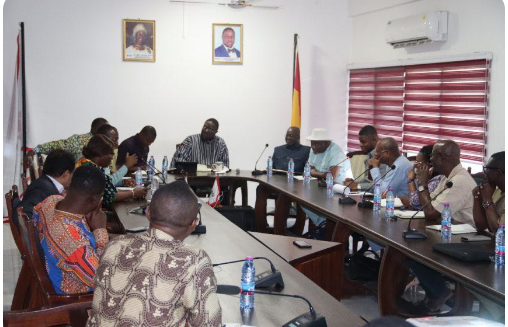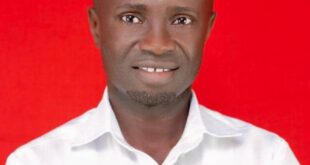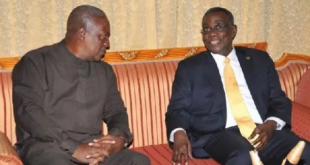The leadership of the Association of Ghana Industries (AGI) met with LAB, a Policy Think-Tank of the National Democratic Congress (NDC), last Friday to talk about the issues facing the industry.
Ahead of the 2024 presidential and parliamentary elections, the NDC group also discussed with them the party’s vision for the nation and asked for the AGI group’s opinions and input on it.
LAB is the NDC’s manifesto drafting body chaired by Prof Kweku Danso Boafo, and it’s expected that the views expressed and suggestions made by the AGI, would make it into the NDC’s 2024 manifesto.
The deliberations focused on John Mahama’s 24-hour economy policy proposal as an anchor for his overarching vision to transform Ghana into an export-led economy through agriculture modernization and mechanisation.
The policy is for increased production and value addition by promoting agro-processing and manufacturing.
It is to incentivize the private sector, particularly indigenous companies to take the commanding heights of the Ghanaian economy.
Business people who attended described the discussions as very insightful and productive.
Present were Prof. Danso Boafo, who is the chairman of LAB, Dr Ismael Yamson, Dr Peter Boamah Otokunor, the NDC’s Director of Interparty and CSOs Relations, Sam Pee Yalley and Alex Segbefia.
Others were Prof. Kpessa White, Nana Oye Bampoe-Addo, Sammy Gyamfi and Prosper Buetu.
Dr Otokunor, whom The Herald spoke to, said the meeting is part of the opposition party’s interactions with Civil Society Organizations (CSOs), Trade Unions and other recognizable groups.
The agricultural economist, described the encounter as the first leg of the NDC’s meeting with AGI, a critical group within the Ghanaian economy.
He told The Herald that the NDC’s 2024 fa gbearer ,would aso be meeting and interacting with the AGI soon which is similar to his recent interaction with the Trade Union Congress (TUC).
Mahama’s 24-hour economy policy proposalc ontinues to receive some props with Economist and Director of Operations at Dalex Finance, Joe Jackson, expressing strong belief in its feasibility.
Jackson emphasized that the policy’s success hinges on the government’s ability to foster a conducive business environment. He highlighted the need for accessible financing and reduced tax burdens to support businesses.
“Businesses are overtaxed, and financing is unavailable to them.” Where is the capital that we need to fund these ventures that we want to start? Though this is a compelling argument, let’s not give too much weight to one side. Is actually a complex problem that requires an integrated approach. Markets have significance. Our inputs must be priced competitively; if they aren’t, I won’t be hiring more workers to cover the loss, no matter what you do. Not in a way. I have no intention of working at night. High taxes should be made simpler and easier. Now let’s consider financial accessibility. However, we must acknowledge that it is feasible. Anyone who asserts that the 24-hour idea
He advocated for simplifying and streamlining the tax system while improving access to finance.
Jackson’s comments were made on The Big Issue Show on Citi TV regarding Mahama’s 24-hour economy policy.
Mr Mahama pledged to implement a 24-hour economy if elected during his campaign tour in the Bono region.
This promise has sparked debate, particularly between members of the NDC and the New Patriotic Party (NPP).
I.n con.trast, Dr Mah.amudu Bawumia, the NPP flagbearer, maintains that the concept of a 24-hour economy is already present in various sectors of the economy and is therefore not a novel idea.
 Home Of Ghana News Ghana News, Entertainment And More
Home Of Ghana News Ghana News, Entertainment And More





